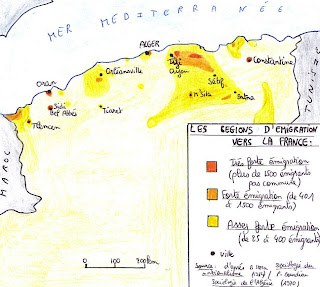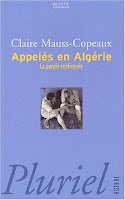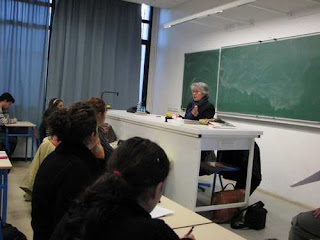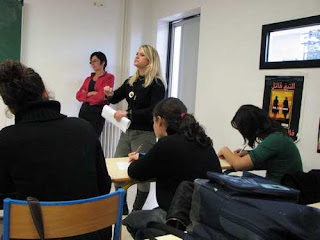The OAS (Secret Army Organization) The OAS: Secret Army Organization
What role did the OAS during the war in Algeria?
I- Created:
1-Context, birth and ideologies :
On May 29, 1958, President René Coty called retired General Charles de Gaulle, following the insurgencies led by supporters Gaullists the maintenance of French Algeria (the country was then formed in 4 French departments). On June 4, 1958, de Gaulle delivered his famous speech in Algiers "I have understood you" 2. Two days later, June 6, De Gaulle cried "Long live French Algeria! "In Mostaganem, before a crowd that includes Europeans and musulmans.Le September 16, 1959, the shock is brutal for all French Muslims from Algeria and loyalists who wake up hearing the General de Gaulle speaking on self-determination. From these circumstances, Joseph Ortiz creates the FNF (French National Front), a movement activist. Many other small groups are born or reborn for rebelling against what they see as "Gaullist betrayal." On January 24, 1960, beginning barricades with the participation of many pieds-noirs from that date the rebellion Algerian conflict becomes a Franco-French. The OAS was born a year later by the fusion of different insurgent movements in Madrid Lagaillarde around Peter, who was involved in arms. Two personalities, strongly opposed the loss of Algeria, will indirectly inspired the founders of the OAS: Raoul Girardet and anthropologist Jacques Soustelle.
2- Members:
Leaders:
General Salan, aka Sun Arrested April 20, 1962 in Algiers and jailed until June 15, 1968
General Paul Gardy (Chief of Staff )
Colonel Godard (Deputy Chief of Staff)
Dr. Jean-Claude Perez (ORO = Organization - Information - Operation) Imprisoned from 1957 to 1965 (death sentence)
Captain Jean-Marie Curutchet (replaces Dr. Perez on 1/1/1962)
Colonel Jean Gardes (organizing rallies)
Jean-Jacques Susini Movement (political and propaganda)
Organization in Algeria: Oran :
1. General Edmond Jouhaud seconded by Commander William.
2. Dufour replaces Col. Gen. Edmond Jouhaud.
3. General Gardy: a directory with revolutionary 5 Members: · Sergeant Captain Peter · Christian • Jean-Marie Léger Curutchet · Denis Bailey • Jean-René Souêtre
Algiers :
1. Colonel Vaudrey
2. Pierre Delhomme responsible in El-Biar (Alger height)
Constantine:
1. Colonel Pierre Chateau-Jobert
2. Robert Martel aka "Chouan of Mitidja.
Organization frontièreOAS-off city:
1. General Vanuxem Paul (aka Verdun);
2. Captain Pierre Sergent: Chief of Staff
3. Organizing rallies: Lieutenant Daniel Godot
4. Political movement and propaganda: Jacques Chadeyron
5. Organization-Information-Operation: Captain Jean-Marie Curutchet
6. OAS Metropolitan Youth (OMJ): Lieutenant Nicolas Kayanakis (aka the Greek) and Jean Caunes France-Mission III: 1. Andre Canal (called the Monocle, arrested in Paris May 4, 1962).
OAS-Madrid: dissident group claiming the central leadership of the OAS.
1. Colonel Antoine Argoud, who will become deputy Georges Bidault.
2. Colonel Charles Lacheroy
3. Commander Peter Lagaillarde
II-The actions of the OAS:
The first victim of the OAS, January 25, 1961, is the liberal lawyer Peter Popie, president of the federation MRP Algiers. Before being shot, he had declared on television: "French Algeria is dead." Enforcement is committed by men of Andre Canal, which at that time had not yet officially joined Organization. The OAS is manifested in France and Algeria by multiple bombings and assassinations. At the end of September 1961, the authorities were more than 1000 terrorist attacks that left 15 dead and 144 wounded, engaging targets of the political union and pro-independence, liberals, and of course the official support of Gaulle. The attacks became more frequent around February 1962. Delta commandos (led by Lieutenant Roger Degueldre) are engaged in deadly wave of killings, and March 15, 1962 Operation Rock and Roll (120 explosions within hours) is triggered. Several murders are committed against six officials of a social education center, including Mouloud Feraoun, writer kabyle.À from 19 March 1962, when the cease-fire in Algeria, the FLN became a legal party, while weakened in this new context saw more and more the Force, the CRS and the Army coordinate their actions against her with the FLN, the OAS claimed to oppose by force the implementation of the Evian agreements and to discourage the French from Algeria to leave the country. Anticipating the outcome of the February 23, Salan capital prepares an instruction, instruction 29: "The irreversible is about to be committed." He developed a plan of insurrection. Participation European population seemed acquired in cities. He is using them as "valuable tool" that must be used as an army to open fire on the CRS and gendarmes. On 13 March, the OAS failed in his attempt to organize the insurrection in the neighborhood Bab El-Oued, an attempt that ended in a crackdown which claimed over 20 lives. March 26, the shooting of street Isly was another failure for the organization that wanted to organize a demonstration. The slogan of the Muslim is required when hunting for commandos Delta.Les OAS leaders are aware that the end is nigh for French Algeria. The organization seeks to prohibit the Europeans to flee Algeria, but they are still 100,000 people who leave in May. This massive population leaving Algeria, the OAS is deprived of its main support. For Susini, it is now to let the Algerians to Algeria. It adopts a scorched earth policy, which requires the destruction of economic and cultural country. On 7 June, the library of the University of Algiers and the mayor are under fire. The laboratories of the Faculty of Science at Algiers jump, PTT facilities are demolished, and the fire is put to the oil tanks in the ports of Algiers and Oran .. The activities of Delta commandos stopped June 17 1962, following an agreement signed between Jean-Jacques Susini, last chief of the OAS and Dr. Shawki Mostefaï representing the GPRA, just before the proclamation of the independence of Algeria (July 1962). This agreement allowed some members of the OAS to leave Algeria. Charles de Gaulle was the target of an attack organized by Bastien Thiry August 22. The presidential motorcade was attacked by three men armed with submachine guns, while transiting the Petit-Clamart. General de Gaulle, who survives, will benefit from the emotion caused by the attempt to propose the election of the president by universal suffrage.
III-Assessment and what was the feeling of the French population on the actions of the OAS?
OAS which has lost its main supports, that of the French population living in Algeria who fled to the hexagon, frightened by the magnitude of the tragic events organized by the two "fronts" and despite the threatening statements June 1961: "The OAS remember the last time that it is forbidden to any inhabitant of Algeria from leaving for vacation this summer, except for serious health reasons. The OAS will have a list of those who have borrowed of maritime or air and apartments of the "holiday" will be bombed after investigation. Those who believe they have valid reasons will expose them in a note to display prominently on their front door. "For the French population of Algeria and undoubtedly, there reigns a climate of insecurity and violence since, as stated in the newsletter published in July 1961, special sections of the OAS would have done on the Algerian territory, 380 terrorist attacks and several éxécutions.Les people not respecting the obligations set by the OAS are in danger of death at any time since "OAS strikes where it wants to" ... At this time of conflict (1961) it does no doubt that the public takes these threats very seriously in deciding to meet them. Thus despite some raproche to independence of Algeria, the OAS perseveres in these actions since January 24, 1962 establishes a directive that imposes a curfew on all days from 21 h in the centers of Algiers Oran and Bone, accompanied by more concrete actions that will reduce the mobility of law enforcement and therefore totally separated the population of legal authority (eg: January 29 is spread on the intersections of the waste oil and nails ...). These actions are intended to create an atmosphere of anxiety and panic ("the psychosis of the night") for residents and autorités.Ces operation called point multiply to cover certain professions such factors, drivers of trams ... All this in order to paralyze the country.The people are hugely affected whether at work or at eux.L the OAS began a policy that packaging and therefore for the people of injustice. However, the organization does not completely satisfy these actions (even if they have a strong impact for the most part) since it extends these operations into the metropolis we call OAS-metro. These operations always had to create a climate of terror, but this time in France. The newspaper Libération published numerous articles between 1961 and 1962 on the organization, for example, that of a girl disfigured in the attack against the office of A. Malraux (then Minister of Home Affairs) with the title "This is what the OAS has a child" ... We can feel the shock of people seeing the photo of this little girl, barely 8 years died. Finally, despite the many attacks, the official negotiations are ongoing and it appears clear that it will be impossible to prevent the signing of an agreement with the GPRA. March 19, 1962, when the cease fire, General Salan calls a resistance that will followed by a total strike called "Operation Dead Cities".
Conclusion:
OAS despite its many violent and peaceful actions and his willingness to keep Algeria French will fail to keep it. The Algeria will become independent and that organization will disappear after his failure with consequences as many people descèdées and injured and the indictment of its main leader and then several will be sentenced to death or life imprisonment, for example General Jouhaud and Dr. Perez.
Work done by Benjamin and Jeremy

























 Then events accelerated. Indeed, Mr. Chirac announced the signing of a treaty of Franco-Algerian inspired by the Franco-German treaty the following year. On the other hand he wanted to end the "war" between France and Algeria by the French law giving satisfaction to the main material and moral claims of all returnees.
Then events accelerated. Indeed, Mr. Chirac announced the signing of a treaty of Franco-Algerian inspired by the Franco-German treaty the following year. On the other hand he wanted to end the "war" between France and Algeria by the French law giving satisfaction to the main material and moral claims of all returnees.